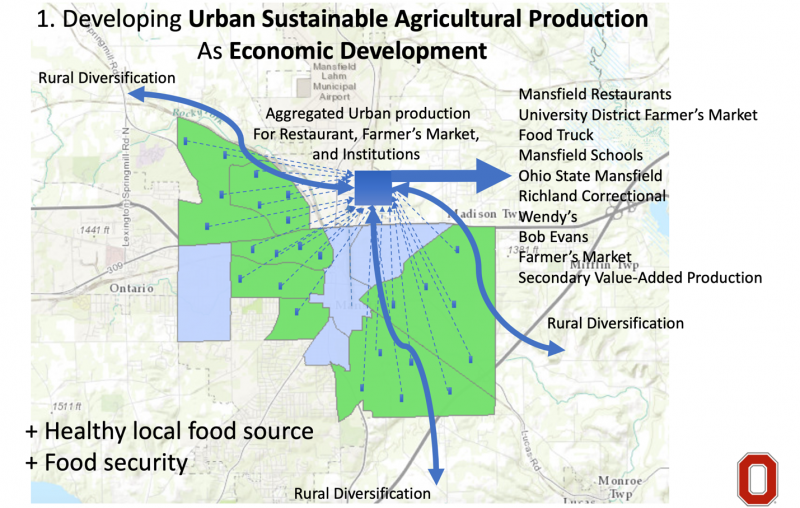Kent (Kip) Curtis
Associate Professor
Ovalwood Hall
1760 University Dr.
Mansfield, OH
44906
Areas of Expertise
- Environment, Technology, and Science
- Food Studies and Urban Agriculture
- United States History
- Mining History
- Global Environmental History
Professor Curtis specializes in Environmental History and Studies with research and teaching foci on mining, environmental ideas, and food systems. He teaches undergraduate and graduate courses in modern United States history and environmental history and offers independent studies in environmental history and the environmental studies and sciences. He is currently Principal Investigator on a $2 million Foundation for Food and Agricultural Research “Seeding Solutions” grant, which began implementation in 2019.
Environmental History of Mining
His well-reviewed first book, Gambling on Ore: The Nature of Metal Mining in the United States, (University Press of Colorado, 2013), is an environmental history of nineteenth-century non-ferrous metal mining. In it, Curtis argues that persistent and recurring uncertainties about the character and extent of ore deposits shaped metal mining development in the United States. Two other essays “Greening Anaconda,” a study of a former smelter city in western Montana, and the award winning “Producing a Gold Rush,” a look at the role of the nation-state in setting the spatial stage for western gold rushes, extend Curtis’s environmental analysis of American mining into the later twentieth and earlier nineteenth centuries respectively.
This year, Curtis published his third mining essay, “’Tanks are Born Underground’: Mining and World War II,” in Robertson, et al, The Nature of War: American Environments and World War II (Cambridge University Press, 2020), in which he links mineral scarcity to the main patterns of 20th century globalization. This essay is the first of his work on a Big History of metal production, which will explore long term trends and repetitive patterns in the history of metals production since its inception about 7,000 years ago. He is particularly interested in exploring relationships between metal deposits, social complexity, and power in human history.
History of Environmental Ideas
Prof. Curtis has a second research interest in the history and application of environmental ideas and ideas about nature. His essay, “The Virtue of Thoreau: Biography, Geography, and History in Walden Woods,” deconstructs the ‘Thoreau as first environmentalist’ trope in environmental history and places Thoreau within his social and spatial context in order to understand Thoreau’s practice. Along the same lines, Curtis worked with a team of scholars led by William Jordan, III, and co-authored “Foundations of Conduct,” a meditation on practical environmentalism. Curtis has also given dozens of public lectures about the application of environmental ideas and philosophy to contemporary sustainability challenges. He has developed a course in the history of environmental ideas that he offers intermittently and as an independent study.
Curtis is also bringing this expertise to program development at the Ecolab at Ohio State Mansfield, where he is leading an Initiative in Ecology as Social Justice.
Applied Food Systems Research
Under the banner of Ecology and Social Justice, Curtis is the Principal Investigator in a community-led food system intervention project in Mansfield, Ohio. In 2016, Curtis designed a whole-system approach to urban agriculture development and in 2018 he leveraged community-University partnerships into a $2 million pilot project now underway in Mansfield to develop that system.

In addition to coordinating development for the initiation of an urban microfarm production system for the small city, Curtis has developed, constructed, and is working with students and alumni to grow food on a demonstration urban microfarm built atop a former parking lot on the Ohio State Mansfield campus. This model small-plot, high-yield microfarm currently produces food for the campus cafeteria, the campus community, and for Richland Gro-Op cooperative.
Curtis recently recorded a TEDx Talk related to the microfarm project entitled, "Fulfilling the Promise of the Land Grant University."
Select Food Project Media
- NICHE Histories of the Future, "Urban Microfarming as an Elegant Solution for a Just and Sustainable World," Kip Curtis
- WMFD, "Senator Sherrod Brown Tours NECIC Urban Farm," May 5, 2021
- College of Arts & Science College News, Mansfield Microfarms craft sustainable urban agriculture model, February 15, 2021
- Richland Source, Urban microfarm dream coming true in Mansfield, October 24, 2020
- Sustainability Institute News, Growing Community Through the Mansfield Microfarm, August 6, 2020
- Richland Source, “Urban Farm a Growing Success in Mansfield,” April 2020
- Mansfield News-Journal, “Stanfield Family Leads way for GrowFourth Urban Farm,” October 2019
- Mansfield New-Journal, “Bonham: 6 New Microfarms to Take Root in Mansfield,” July 2019
University Committees and Participation
Faculty Fellow, Office of Outreach and Engagement, 2020-2021
STEAM Factory Member since 2015
Energy Academic Collaboration Council 2017-2020
Advisory Committee for Arts & Humanities Discovery Theme “Living Futures” focus area 2018
